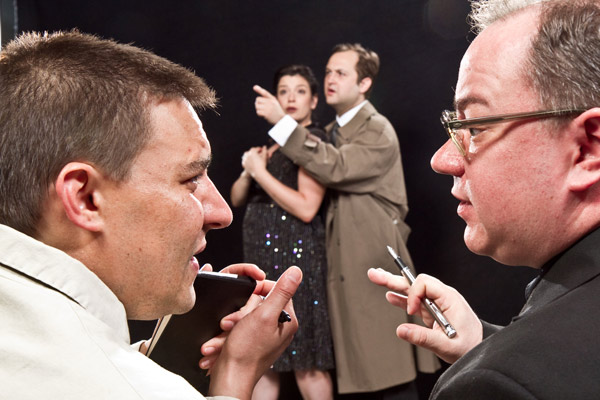
From left: Moon (Philip Winston)—watching Cynthia (Meredith Bell Alvarez) and Inspector Hound (Joseph Stearns) in a play—discusses the action with Birdboot (Jon Steinhagen).
In 1978, the humor factory that was the National Lampoon produced a replica parody of a mid-sized regional Sunday newspaper. The blaring front-page headline announced that a local woman and her daughter had suffered a ruined vacation. The small-type subhead revealed why: A volcano had destroyed Japan. The parody featured all the appropriate elements. A story in the lifestyle section helped readers consider the question “Is Your Child a Dip?” An ad insert for a discount store, Swillmart, offered, among other products, a “family feeding trough” and a facsimile menu from the Last Supper—signed by “Jesus H. Christ” himself. (Disclaimer: I’m operating on memory here.)
The National Lampoon nailed it with even the tiniest details, including a gem buried in the back of the paper. The weekly chess column opened with the usual gobbledygook description of a match—king’s pawns and queen’s bishops shifting around the board—until, about halfway through, the columnist moves a piece to the “queen’s carport” and then quickly erupts in a furious rant because no one, not an editor, a copy editor, or a single subscriber ever reads the column. And, of course, the rant is printed verbatim because no one does.
I have no idea how the parody paper sold (though I see through Amazon that a book version was published in 2004). But at the time it first came out I worked at a mid-sized regional paper, and my colleagues and I thought the National Lampoon had produced one of the funniest documents ever.
That was about the same time that I saw my first production of Tom Stoppard’s The Real Inspector Hound, the playwright’s send-up of a staged murder mystery of The Mousetrap type. Stoppard started out as a journalist and a theatre critic at regional papers in England, and his play brilliantly hinges on two fatuous critics at hinterland newspapers sent to review a piece of local tripe. One of them, Birdboot, uses the promise of his meager influence to seduce naïve young thespians; the other, Moon, bitterly resents being stuck behind the chief reviewer at his paper.
Saturday night, I took in the Signal Ensemble Theatre’s rendering of Hound and I was reminded that the highlight (for me) of the play comes when Moon, finally given the chance to showcase his talent, spins into an hallucinatory imagining of the review he will write—a thunderously inflated speech that reconsiders the conventions of the theatre, drops the names of masters from Shakespeare to Pirandello, and concludes by asking portentously (as an ambitious critic must!), Where in this work is God?
Even in Signal’s flawed production, Stoppard had me in delighted thrall.
Against the background of the sinking journalism trade, listening to Moon howl and recalling the Lampoon parody set me off on a premature case of nostalgia for vanishing local newspapers. Yes, yes, they play an acute civic role that needs to be filled. But they’ve also served as a magnet for a particular sort of character: smart, glib, skeptical, avid. Also, pretentious, myopic, overbearing, and privately aggrieved at failing to achieve the fame and riches that is often a subject of reporting. People like that sometimes produce great journalism, sometimes end in personal anguish. But as Stoppard and the Lampoon editors knew, the raw desires of the newspaper world make for rich comic material. So to the lament for the demise of the third-tier newspaper add a lament for the third-tier newsman. After all, someone out there has to ask where God is hiding in our most inane, most trivial endeavors.
WHAT THE CRITICS THOUGHT OF THE REAL INSPECTOR HOUND
- The Chicago Tribune’s review by Chris Jones, 8/17/2010.
- The Chicago Sun-Times’s review by Hedy Weiss, 8/18/2010.
Photographs: Johnny Knight


